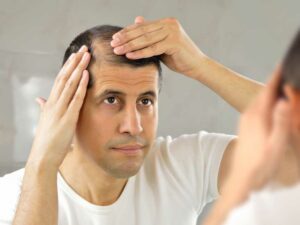Hair Loss Study Abstract
The clinical manifestations associated with hyperandrogenism, such as hirsutism and acne, are disturbing to most patients. In addition to correcting androgen-related problems, concerns such as contraception or other metabolic problems (for example, lipid/lipoprotein abnormalities, diabetes, hypertension) associated with these disorders and the effects of unopposed estrogen on the endometrium also need to be considered. Oral contraceptives are a therapeutic modality that may address these multiple problems. The potential mechanisms of action by which oral contraceptives correct excess androgen states include gonadotropin suppression, reduction of circulating androgens, increased androgen binding, suppression of adrenal androgen secretion and inhibition of 5 alpha-reductase, and androgen receptor binding. In normal women, there is good evidence that these actions occur with the use of oral contraceptives. Among women with anovulatory hyperandrogenic states, such as polycystic ovary syndrome, the response to oral contraceptives in each of these areas is somewhat more variable. However, oral contraceptive preparations that are more estrogen dominant appear to produce many of the desired effects. From a clinical standpoint, 60-100% of women with hirsutism improve on oral contraceptives; acne shows improvement in a high percentage of women as well. The use of oral contraceptives also reduces the risk of endometrial hyperplasia that may be associated with anovulatory states. Finally, current low-dose preparations containing the newer progestins (for example, norgestimate and desogestrel) appear to be either neutral, or perhaps beneficial, with respect to their metabolic impact.
Author
Burkman RT Jr.
Address
Henry Ford Hospital, Department of Obstetrics and Gynecology, Detroit, Michigan 48202.
Source
Am J Med, 1995 Jan 16, 98:1A, 130S-136S
Language
English





